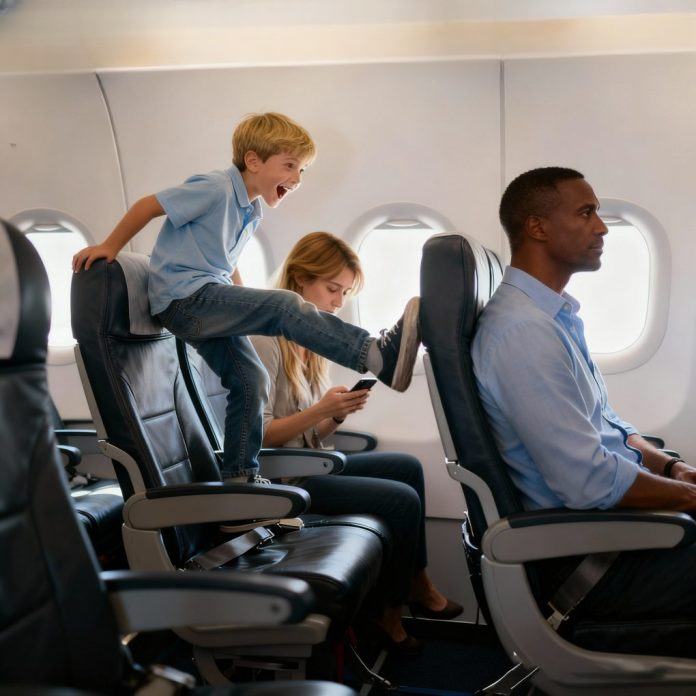The Flight That Tested Patience
The steady hum of the Boeing 737’s engines filled the cabin as it cruised above the sprawling Midwest. Andrew Collins, a seasoned investment consultant from Chicago, sank into his seat with a long exhale. His week in Dallas had been grueling—back-to-back client meetings that left him drained. Now, finally returning home, he had a brief moment to himself. His briefcase rested under the seat ahead, his tablet open to the presentation he’d need the next day. Thoughts of his family and a night of rest brought him a fleeting sense of relief.
Flights had always been Andrew’s quiet time—to think, work, or simply unwind. But this evening, his patience would be tested in a way he hadn’t anticipated.
Barely ten minutes into the flight, he felt it: a sharp thud against his lower back. Another. And another. At first, he assumed it was turbulence. But soon he realized the pattern—small feet persistently kicking the back of his seat.
Glancing over his shoulder, he saw a boy, no more than seven, swinging his legs back and forth. His mother, glued to her phone, seemed completely oblivious.
Andrew tried to ignore it at first, hoping the kicks would stop. But when they didn’t, he addressed the mother politely.
“Excuse me,” he said, calm but firm. “Could you ask your son to stop kicking the seat? It’s becoming uncomfortable.”
She glanced up briefly, nodded without a word, and returned to her phone. The kicks continued—thud, thud, thud—each one jarring his back and scattering his focus. Andrew clenched his jaw, tried to concentrate on his tablet, but the persistent disturbance left him frustrated and tense.
After another polite request met with dramatic sighs and dismissal, he pressed the call button for a flight attendant. Soon, a young attendant arrived, crouched by the boy, and gently asked him to stop. The boy complied momentarily, but the moment the attendant moved away, his foot resumed its assault. His mother shrugged. “I can’t control him,” she muttered.
Andrew knew he had two options: endure the rest of the flight in irritation or find a subtle way to redirect the lesson. Drawing on years of dealing with difficult clients, he opted for strategy over confrontation.
He observed the boy’s tray table: crayons scattered, a plastic cup of juice perched dangerously close to the edge. Timing it just right, he slightly reclined his seat the next time the boy kicked. Instantly, the juice tipped over, spilling onto the coloring sheets—and, crucially, onto the mother’s lap.
The reaction was immediate. The mother yelped, flailing to save her clothes. The boy froze, foot mid-air. Around them, passengers stifled quiet laughter.
“Mom! It wasn’t me!” the boy protested, shocked.
Andrew leaned back, expression neutral. To everyone else, it seemed like a simple accident. To him, it was a small, elegant lesson: behavior has consequences.
The kicks stopped. The boy sat sulking, arms crossed, subdued. His mother, distracted and damp, paid no further attention to Andrew. For the rest of the flight, peace settled over the cabin.
Finally, Andrew returned to his tablet, reviewing slides without interruption. A faint smile tugged at his lips—not triumph, but quiet satisfaction. He had restored order without yelling, arguing, or escalating the situation.
As the plane began its descent into Chicago, he reflected on the experience. Some people ignore the effects of their actions, no matter how obvious. Sometimes the only way to correct behavior is to let consequences speak for themselves.
The spilled juice had done just that. Lessons delivered, balance restored, and Andrew walked off the plane with calm composure, ready to return to his life—brief moment of frustration already behind him.
